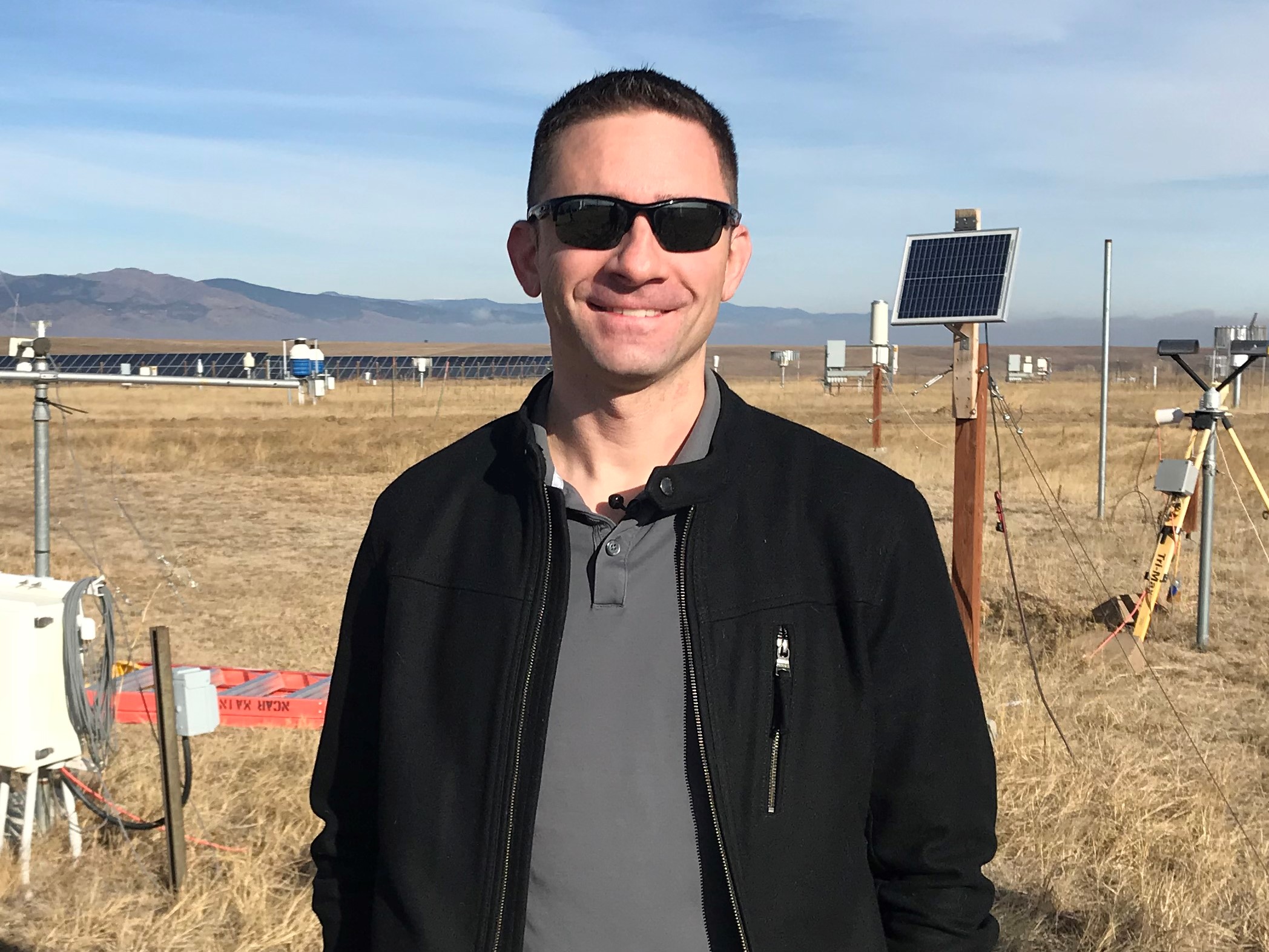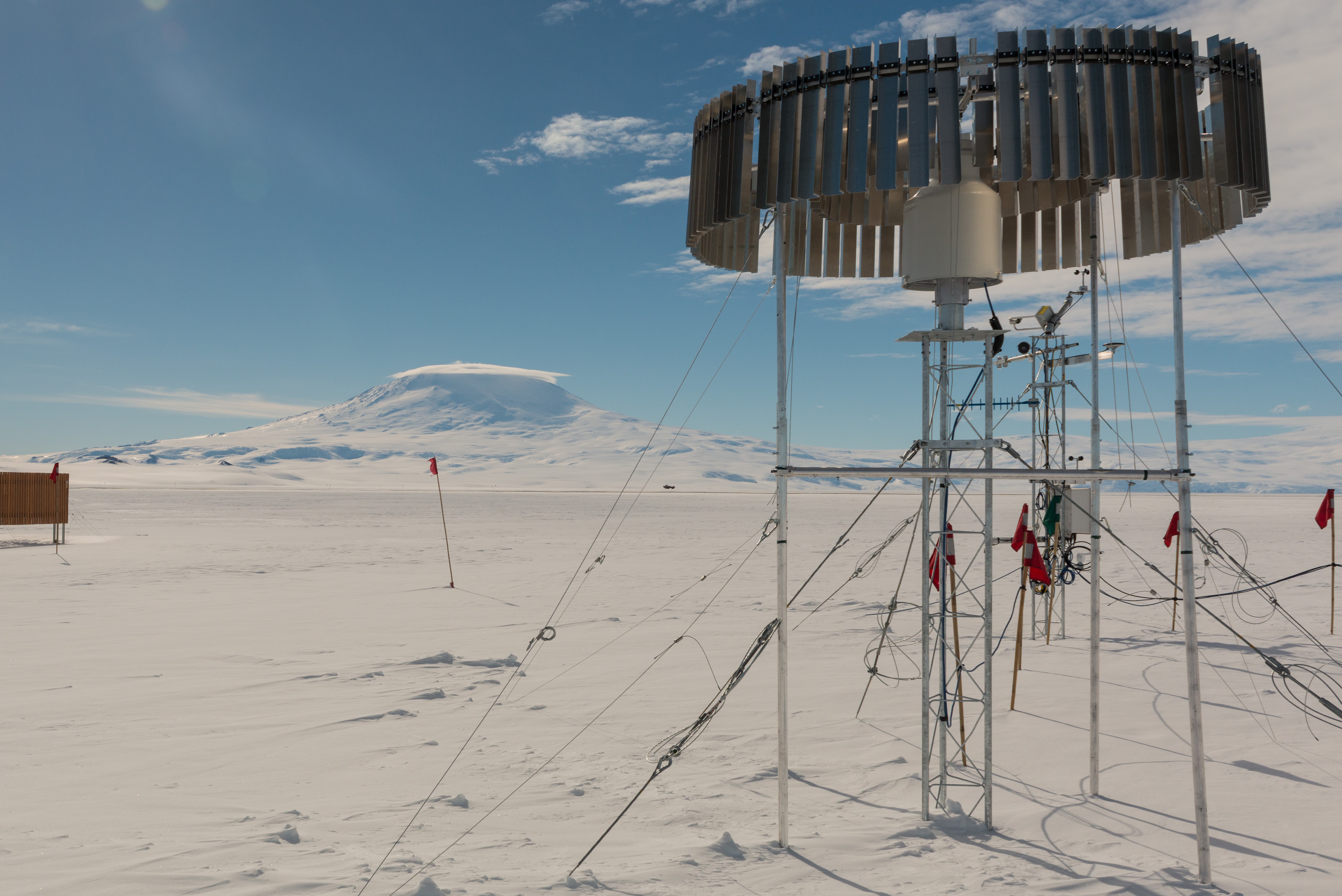The Antarctica Project: Catching Snow
Special Stories
14 Feb 2018 10:41 AM
Imagine traveling to the southern-most tip of the world to find snow and accurately measure it. National Center for Atmospheric Research Scientist Scott Landolt did just that, with the goal of accurately measuring falling snow in Antarctica.
 NCAR Scientist Scott Landolt and a team of researchers traveled to Antarctica to accurately measure falling snow during the fall of 2017.
Dubbed the Antarctica Project, Scott Landolt and a team of researchers traveled to the southern-most continent in the world during the fall of 2017 to accurately measure falling snow, which has never been done before.
According to Landolt, “The primary goal of this project is to really show we have this ability at this point in time to actually measure snow that’s falling.”
Changes in the amount of snow and ice on Antarctica can lead to changes in ocean sea levels around the world, especially important to coastal communities.
But it is challenging carrying out this research because, of all things, the weather. First, Antarctica is a desert, only measuring about 6 inches of precipitation a year, limiting the opportunity for snow. Second, it’s extremely windy. Wind can be sustained at 60 mph and gust higher than 120 mph for more than a day - making it very difficult to measure, and even distinguish between falling and blowing snow.
To overcome these and other challenges, Scott and his team developed and tested an instrument that could accurately measure falling snow at the National Center for Atmospheric Research’s Marshal Field Site in Boulder, CO. This instrument, or precipitation gauge, would be able to slow the wind down around it so that snow could fall in and get measured.
NCAR Scientist Scott Landolt and a team of researchers traveled to Antarctica to accurately measure falling snow during the fall of 2017.
Dubbed the Antarctica Project, Scott Landolt and a team of researchers traveled to the southern-most continent in the world during the fall of 2017 to accurately measure falling snow, which has never been done before.
According to Landolt, “The primary goal of this project is to really show we have this ability at this point in time to actually measure snow that’s falling.”
Changes in the amount of snow and ice on Antarctica can lead to changes in ocean sea levels around the world, especially important to coastal communities.
But it is challenging carrying out this research because, of all things, the weather. First, Antarctica is a desert, only measuring about 6 inches of precipitation a year, limiting the opportunity for snow. Second, it’s extremely windy. Wind can be sustained at 60 mph and gust higher than 120 mph for more than a day - making it very difficult to measure, and even distinguish between falling and blowing snow.
To overcome these and other challenges, Scott and his team developed and tested an instrument that could accurately measure falling snow at the National Center for Atmospheric Research’s Marshal Field Site in Boulder, CO. This instrument, or precipitation gauge, would be able to slow the wind down around it so that snow could fall in and get measured.
 This is the instrument designed by Scott Landolt and a team of researchers and used to measure falling snow in Antarctica.
Scott and his team then traveled to Antarctica with four of these instruments to deploy them on the continent.
Once the team arrived to Antarctica, they had to go through survival training before they were allowed to carry out the project.
To learn more about the work on this project, Scott Landolt will be giving a presentation at the NCAR Mesa Lab in Boulder, Colorado during mid to late February. This presentation will also be streamed online. Click the links below for more information.
February 21st Presentation
February 24th Presentation
For WeatherNation, I am Meteorologist Marcus Walter.
This is the instrument designed by Scott Landolt and a team of researchers and used to measure falling snow in Antarctica.
Scott and his team then traveled to Antarctica with four of these instruments to deploy them on the continent.
Once the team arrived to Antarctica, they had to go through survival training before they were allowed to carry out the project.
To learn more about the work on this project, Scott Landolt will be giving a presentation at the NCAR Mesa Lab in Boulder, Colorado during mid to late February. This presentation will also be streamed online. Click the links below for more information.
February 21st Presentation
February 24th Presentation
For WeatherNation, I am Meteorologist Marcus Walter.
 NCAR Scientist Scott Landolt and a team of researchers traveled to Antarctica to accurately measure falling snow during the fall of 2017.
Dubbed the Antarctica Project, Scott Landolt and a team of researchers traveled to the southern-most continent in the world during the fall of 2017 to accurately measure falling snow, which has never been done before.
According to Landolt, “The primary goal of this project is to really show we have this ability at this point in time to actually measure snow that’s falling.”
Changes in the amount of snow and ice on Antarctica can lead to changes in ocean sea levels around the world, especially important to coastal communities.
But it is challenging carrying out this research because, of all things, the weather. First, Antarctica is a desert, only measuring about 6 inches of precipitation a year, limiting the opportunity for snow. Second, it’s extremely windy. Wind can be sustained at 60 mph and gust higher than 120 mph for more than a day - making it very difficult to measure, and even distinguish between falling and blowing snow.
To overcome these and other challenges, Scott and his team developed and tested an instrument that could accurately measure falling snow at the National Center for Atmospheric Research’s Marshal Field Site in Boulder, CO. This instrument, or precipitation gauge, would be able to slow the wind down around it so that snow could fall in and get measured.
NCAR Scientist Scott Landolt and a team of researchers traveled to Antarctica to accurately measure falling snow during the fall of 2017.
Dubbed the Antarctica Project, Scott Landolt and a team of researchers traveled to the southern-most continent in the world during the fall of 2017 to accurately measure falling snow, which has never been done before.
According to Landolt, “The primary goal of this project is to really show we have this ability at this point in time to actually measure snow that’s falling.”
Changes in the amount of snow and ice on Antarctica can lead to changes in ocean sea levels around the world, especially important to coastal communities.
But it is challenging carrying out this research because, of all things, the weather. First, Antarctica is a desert, only measuring about 6 inches of precipitation a year, limiting the opportunity for snow. Second, it’s extremely windy. Wind can be sustained at 60 mph and gust higher than 120 mph for more than a day - making it very difficult to measure, and even distinguish between falling and blowing snow.
To overcome these and other challenges, Scott and his team developed and tested an instrument that could accurately measure falling snow at the National Center for Atmospheric Research’s Marshal Field Site in Boulder, CO. This instrument, or precipitation gauge, would be able to slow the wind down around it so that snow could fall in and get measured.
 This is the instrument designed by Scott Landolt and a team of researchers and used to measure falling snow in Antarctica.
Scott and his team then traveled to Antarctica with four of these instruments to deploy them on the continent.
Once the team arrived to Antarctica, they had to go through survival training before they were allowed to carry out the project.
To learn more about the work on this project, Scott Landolt will be giving a presentation at the NCAR Mesa Lab in Boulder, Colorado during mid to late February. This presentation will also be streamed online. Click the links below for more information.
February 21st Presentation
February 24th Presentation
For WeatherNation, I am Meteorologist Marcus Walter.
This is the instrument designed by Scott Landolt and a team of researchers and used to measure falling snow in Antarctica.
Scott and his team then traveled to Antarctica with four of these instruments to deploy them on the continent.
Once the team arrived to Antarctica, they had to go through survival training before they were allowed to carry out the project.
To learn more about the work on this project, Scott Landolt will be giving a presentation at the NCAR Mesa Lab in Boulder, Colorado during mid to late February. This presentation will also be streamed online. Click the links below for more information.
February 21st Presentation
February 24th Presentation
For WeatherNation, I am Meteorologist Marcus Walter.All Weather News
More